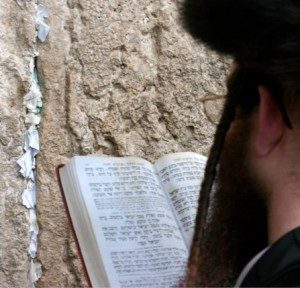 It’s good to have a taste of Jesus’ customs and culture, but as Christians, our goal is not to become more Jewish, but rather to become more like Jesus.
It’s good to have a taste of Jesus’ customs and culture, but as Christians, our goal is not to become more Jewish, but rather to become more like Jesus.
There is, however, one Jewish practice that all of us would benefit from, and that is adopting a type of Jewish prayer which can transform a person’s spiritual life. These have been used for thousands of years, even back to New Testament times.
What was this wonderful style of prayer? It is the habit of “blessing” the Lord. It is an attitude of continual thankfulness toward God that expresses itself through brief prayers that acknowledge him as the source of every good thing. It ultimately comes from the Scriptures, when Moses admonished the Israelites not to forget the Lord:
When you have eaten and are satisfied, you shall bless the LORD your God for the good land which He has given you. Beware that you do not forget the LORD your God…(Deut. 8:10-11)
It was easy for the Israelites to cling to God in the desert, but very easy to forget God when times got better and they prospered in the Promised Land. The cure, according to the rabbis, was to continually remind themselves of God’s care by uttering a short prayer of thanks, to “bless the Lord.”
This pervasive act of prayer kept God’s presence and love continually on their minds. Jesus and Paul both would have practiced it, and Paul may have had it in mind when he told Christians to “Be joyful always; pray continually; give thanks in all circumstances” (1 Thes. 5:16-18).
A Practice from Before Jesus’ Time
Before the time of Christ, the Jews developed a number of short blessings to be said whenever the occasion arises, in addition to saying longer prayers in the morning and evening. Some of them are now prayed in the daily synagogue service. Modern custom begins all of them by saying, “Blessed are you, oh Lord our God, King of the Universe.”
The idea is not to bless objects and people, in our usual Christian sense of the word, but to bless the Lord, with the understanding that we are focusing on him as the source of all blessing. The word for bless, barak also means “to kneel,” suggesting that when we bless God, we mentally bow on our knees to worship him.
In Jesus’ day the first line was probably just “Blessed is he,” but the rabbis felt it was important to be reminded that God is King over us in order to “receive on ourselves the Kingdom of God,” so they added the rest of the line later. So in these prayers we mentally kneel toward God, remind ourselves of his goodness, and that he is our King.
I n the gospels it says that Jesus “took the bread and blessed.” (The NIV says “gave thanks” but more literal translations use the word “blessed.”) Some translations incorrectly add the word “it,” to sound as if Jesus “blessed it.” But the idea of blessing the Lord is to thank him for providing, not to confer holiness on the food. Some of our table prayers even reflect this misunderstanding.
n the gospels it says that Jesus “took the bread and blessed.” (The NIV says “gave thanks” but more literal translations use the word “blessed.”) Some translations incorrectly add the word “it,” to sound as if Jesus “blessed it.” But the idea of blessing the Lord is to thank him for providing, not to confer holiness on the food. Some of our table prayers even reflect this misunderstanding.
We know what words he said – most likely, “Blessed is he who brings forth bread from the earth.”
When Jesus did miracles, the people “glorified God,” perhaps exclaiming, “Blessed is he who has performed a miracle in this place!” It was customary to pray this blessing at a site where a miracle occurred. So when Jesus healed ten lepers and only one, a Samaritan, came back and loudly blessed God, Jesus wondered why the other nine hadn’t returned to do the same thing (Lk 17:12 -19).
For Everything a Blessing
In Psalm 24:1 it says that “The earth is the Lord’s and the fullness thereof” and the rabbis of Jesus’ day and earlier decided that everything that we enjoy in life should cause us to bless God. In the Mishnah, the record of rabbinic thought from before Jesus’ time until about 200 AD, the first book is devoted entirely to blessings.
In the most ordinary things they found ways of praising God, and these blessings have God at their center. They contain no personal pronouns — focusing utterly on him, and not on the person praying. They are simply statements that praise God for his goodness.
A person was supposed to devote his first thoughts upon waking to praising God once again for each part of his body that was functioning. The very first thing that would have woken them up was probably a rooster’s crow. So in the first century they would have said, “Blessed is he who has given to the cock understanding to distinguish between day and night!”
When they opened their eyes they said, “Blessed is he who opens the eyes of the blind!” When they dressed they said, “Blessed is he who clothes the naked!” They also said this when they put on a new piece of clothing.

In their experience of nature they also blessed God. When the first flowers were seen on the trees in the spring, they said, “Blessed is he who did not omit anything from the world, and created within it good creations and good trees for people to enjoy!” After a long, cold winter, who isn’t happy to see these little signs of new life?
When they heard thunder or an earthquake that inspired fear, they also blessed God by saying, “Blessed is he whose strength and power fill the world!” Next time there is a windstorm, step outside and remind yourself of God’s amazing power.
When it rained, they said, “Blessed is he who is good, and gives good things!“I thought this was very odd at first, since rainy days are bad days to us. But in Israel where water is greatly needed, rain is source of joy. When you think about it, our abundant food here also is dependent on the rain that we always complain about.
 I have since realized that every time I complain about the weather, it’s a way of convincing myself that yet another day has come when God wasn’t faithful and that he decided not to care about me. It’s a minor habit to change, but my outlook on life improved when I stopped finding something to grumble at God for every time I stepped outside.
I have since realized that every time I complain about the weather, it’s a way of convincing myself that yet another day has come when God wasn’t faithful and that he decided not to care about me. It’s a minor habit to change, but my outlook on life improved when I stopped finding something to grumble at God for every time I stepped outside.
Blessings for Life’s Seasons
They had blessings for the highs and lows in life as well. When they went through a long, difficult time and finally had relief, or celebrated some happy event for which they waited, they said, “Blessed is he who has allowed us to live, and sustained us and enabled us to reach this day.” When a son returned home from war, or when a baby was born, or some other wonderful thing, they uttered this prayer to praise God for bringing them to that point in their lives.
Even in times of grief, when someone died or they heard tragic news, they blessed God. They said, “Blessed is he who is the true judge.” It was a reminder that God was still good, even when they heard about tragic events, and that he will ultimately bring justice even where justice can’t seem to be found.
Remembering God’s Kindness
It’s easy to start worrying that God is not in control, and not remember his continual faithfulness that sustains every minute of the day. In Psalm 103, David shares the secret for how to keep God’s loving care on your mind:
Bless the LORD, O my soul;
and all that is within me, bless his holy name!
Bless the LORD, O my soul, and forget not all his benefits,
who forgives all your iniquity, who heals all your diseases,
who redeems your life from the Pit,
who crowns you with steadfast love and mercy,
who satisfies you with good as long as you live
so that your youth is renewed like the eagles.
Psalm 103:1-5, RSV
~~~~~
For more about this rich practice of prayer, see the chapter “For Everything a Blessing” in Sitting at the Feet of Rabbi Jesus.
(Images courtesy of kolya, lovestruck and martin labar at flickr.com.)
Valerie says
Thank you for this. I can only aspire to be this conscientious throughout the day! Truly, it is a fabulous practice to bring across “boundaries” as we all praise the God of Abraham, Isaac, and Jacob…
Ann Sturdy says
I am going to make this a new way of life! Thank you so much.
Brandon Eckardt says
This is truelly awesome acknowldging him who bares our burdens in all we do. This is prayer I believe, walking in a constant awareness & appreciation of what has been bestowed upon us & how we’ve been blessed with so much! In Genises ch 3 we see how the sons of Seth called upon the name of the Lord. The Hebrew word for called is tefilla, the picture to the word is the front of the head, the side of the head, the back of the head & an ox head going into a yolk…so to “call” on the name of the Lord as Seth’s sons did in Gen 3 is basically; a turning of the head & becoming aware of HIM who carries our burdens. An ox head in 1st centuary Israel conitated a priest so if Christ is our great high priest & HE carries our burdens then prayer would be us becoming aware of HIM constantly. Lois You’ve truelly put me on a Hebraic journey since I’ve come across you’re site & daily I’m learning new ways of thinking like a Hebrew. Thanx be to God for you! May you always be covered with the dust of our Rabbi!
Elisheva says
This is a truly brilliant and very inspiring article and certainly one that we should all adhere too.
I love this website and I look forward to visiting a lot more often.
Blessings
Elisheva
tomas says
for the first time i find that an article written about jesus that speaks of his original way of being and customs. this is truly a blessing to find that there are people out in this world that can relate to jesus and his original way of being.
Russ says
Thank you for being a blessing by sharing this with us. It certainly challenges me to change my daily walk with Christ.
Antonio says
“It is good to have a taste of Jesus’ customs and culture, but as Christians, our goal is not to become more Jewish, but rather to become more like Jesus.”
As far as I know Jesus is a Jew so if you want to become like Jesus you have to become more Jewish.
Shalom!
Martha Bastin says
Blessed are you, oh Lord Our God, King of the Universe!
This is a verse I will definitely look up! It is so easy to forget, no matter how well we know this to be true, that God is the God of the Universe and not just our own Abba. I mean by that, that we sometimes tend to put Him into our own personal worlds of needs, forgetting to look at the big picture; forgetting to look and see Him in His awsome splendor.
Thank You for reminding me just how important it is to sing His praises and Bless His name; this is the one thing in life we cannot do to excess.
“Be joyful always; pray continually; give thanks in all circumstances” (1Thes. 5:16-18).
Rena says
I have just found this website and finished reading the article on prayer. What a challenge for me to practice daily.
Brandon says
So often we take for granted the blessings God gives us. It is so easy to come up with prayer requests but when it comes to thanksgiving it is easy to forget. Even Jesus the Son of God thanked God for the bread. He being part of the trinity if he feels the need to thank God we should if we are following his example. I appreciate the reminder to thank God in all things.
Megan Balder says
I loved this article on prayer. I find myself relating especially to the Israelites in the desert, how they would cling to God in their times of need and then forget them when everything was okay. This is very similar to my own prayer life. I find myself only talking to God when I need something from him, rather than trying to form a solid relationship with him. This is a great challenge for me and I believe that all Christians could benefit from this also.
Anna Van Til says
I’ve tried to do this before–thank God continually–but it never has worked very well. I didn’t know that it was a Jewish tradition, and having certain phrases for every situation would certainly help. I still don’t really understand what we can do to get ourselves into this habit, and not just do it sometimes and then accidentally forget during most other times.
Kylee says
There are some great insights in this article – thanks for sharing! Many times while praying we say, “Please bless this food unto my body,” but why should we bless the food? Let’s bless the God who provided food for us! Everything that we love and enjoy in life should make us bless God. Even before Jesus’ day, every single thing the people noticed or remembered was another reason to praise God. After reading this article, I hope to bless God more often for the beauty that’s found in my everyday life. Today I bless the Lord because of the beautiful sunrise, the delicious cinnamon rolls I devoured, the warm car I drove to school in, and the friends that greeted me at school.
Marilee Wells says
What good and encouraging words Kylee! I’m reading them January 1, 2024, and my heart is thanking “You, O Lord God, King of the universe, Who made Kylee.”
Emily says
This is a really great article! I have always been interested in Jewish traditions, and I think it is very interesting the way that Jewish people approach their faith, and that they always keep Jesus as their focus point. I think it is a very valid point that Christians typically pray to God when they feel that they need him, and not when they feel that life is at a good point. Saying little things to “Bless God” and keep him as our focus point in all moments of our life would be a great way to become closer to him.
Ron says
I love the connections that you’ve made in this article — it really helps! I never really thought about the origins of praising God for our food. I know that I’ve gotten into the habit of only thanking God when times are tough or when times are great, not in between. I am glad that we thank God for our food, but how much does that really mean if most of the praisers aren’t sincere? I suppose it still serves as a reminder, if nothing else, that there is someone to thank.
Hannah says
This is such a fantastic reminder, and a great way to keep God in the forefront of your mind. I find it far too easy to become distracted by the world, but there is a blessing for everything because God is ruler of everything. It definitely reminds me of Fiddler on the Roof, in which there’s a blessing for the sewing machine, and also a blessing for the Tsar: “May the Lord bless and keep the Tsar . . . far away from us!” 🙂
I must admit that the concept of ME “blessing” GOD causes me to pause sometimes. I feel as if to bless someone means to have the power to bestow goodness upon them, or something like that. I often connect the act of “blessing” with someone with authority, like how a father blesses an engagement. Yet I feel as though I have no authority to bestow a blessing on anyone, much less God. I’m sure there are multiple ways to look at the word “bless”, but either way, it’s such a great habit to get into in order to keep God in your thoughts. It’s certainly something I could improve in. Thanks so much for sharing!
Sadie says
I think that this was a really interesting article to read. In our sitting at the feet of Rabbi Jesus assignment we need to say that we were blessed by our best day, worst day and two things within the bast hour. I think it is really cool to think about hoe we have to bless the Lord in everything we do because He has a reason for everything. I loved reading this article because its always a good reminder to have our prayer be a blessings to the Lord and to constantly be thankful for what we have and what he has done for us.
Beth says
It’s so refreshing and inspiring to read something like this. It’s somewhat sad to think that we’ve lost so much thanks in our culture today and that we lean towards complaining. It’s such a good reminder to us to look back at our rabbi and how he lived to follow his example and be more like him.
Abbie says
Dear Dr. Tverberg,
Thank you for sharing your thoughts on prayer. This post is a good reminder that when we try to be like Jesus, sometimes we need to do things the Hebrew way. It is also a good reminder that we need to bless God in all of our circumstances: the good and the bad. Also, that everyday is a blessing from God, and we should thank Him more often than we might be accustomed to as well as for things that are big blessings that often we might overlook.
~Abbie
FREDDY says
SHALOM
Pierre Herve Bocquee says
I am sorry to disappoint those who believe that we ought to pray to the king of the Universe. The bible does not command us to pray that way. This is Judaism and those Christians that has gone back under the law. They have rejected what Jesus has done and wants to be Jews. The word universe is not found in scripture. Jesus taught us how we should pray Mathew 6:9. Our father in heaven… Timothy warned us that in the last days many will fall away from the faith. Let’s use the gift of discernment to obey and follow the scripture as it was written.
william h Haskins says
May the blessing of Yahshua the Messiah through his blood keep us All thru the Ruach Hakodesh Holy Spirit and thru the Holy Spirit.Amen.
Andrea says
Do you think that Jesus taught His Disciples the Our Father (Lord’s Prayer) in Hebrew? Is there any early evidence of this? What do you consider the earliest Hebrew translation of the Our Father?
Rabbi Dolch says
AMEN! This site is awesome. Blessed be the name of the Lord.
Joe says
Why do Jews pray this ” prayer ” which seems more a curse,especially on Christian’s?
Daily_Prayers/Shemoneh_Esrei/Birkat_HaMinim/birkat_haminim.html
Birkat HaMinim –
Against Heretics
This “blessing,” originally the nineteenth of the Amidah, was instituted at the council of Yavneh sometime after the destruction of the second Temple, and was composed in response to the Essenes and early Messianic believers in Yeshua as Mashiach.
Note that in its present form, this blessing does not seem to target Messianic Jewish believers (the key word lamalshinim is normally rendered “for the slanderers”). But the Talmud (B’rakhot 28b-29a) states that the original form of this blessing had the term laminim, which is rendered “for the sectarians,” which was generally understood to be the Essenes and Messianic Jews of that time. “If the chazan makes a mistake in any other of the blessings they do not remove him, but if he makes a mistake when saying the Birkat HaMinim they remove him because he is suspected of being a min himself” (B’rakhot 28b).
In short, the “blessing” was used as a sort of litmus test by the Rabbinics: a Messianic Jew could faithfully recite the other eighteen blessings of the Amidah but could hardly invoke a curse on followers of Yeshua the Mashiach. In this way, persons not reciting the Birkat HaMinim were suspected of heresy and subject to cherem (excommunication).
Blessing Twelve: Birkat HaMinim
Translation:
And for slanderers [sectarians] let there be no hope, and may all the evil in an instant be destroyed and all Thy enemies be cut down swiftly; and the evil ones uproot and break and destroy and humble soon in our days. Blessed art You, LORD, who breaks down enemies and humbles sinners.
Lois Tverberg says
You’re right, Jews do pray the Birkat HaMinim and have done so for thousands of years. And yes, it’s against heretics, which includes messianic believers.
I think it’s actually important for Christians studying their Jewish roots to know that conflict has gone on over the centuries. Christians persecuted Jews who didn’t believe in Christ, and Jews responded by revising synagogue liturgies and prayers to avoid messianic ideas. It’s an unfortunate reality, and it does influence the conversation that went on about Jesus and goes on even today.
It’s tempting for people who are new to get enamored with Judaism as Jesus’ true setting and read without discernment. For centuries Christian scholars have gone too far the other way, avoiding it entirely. Now is the time for us to approach Jesus’ Jewish context with discernment and wisdom. This takes much more thought and study.
Boodram Supersad says
In the original writings who does the word ‘HIM’ in John 3:16 refer to? Should we not follow God and Godliness and accept that GOD has provided a Lamb to take away our sin and Bless Him for that? I keep hearing people praying to Jesus. Is this correct?
Anthony Joseph Smith says
Urgent desperate prayer request:
Hallelujah Jesus, Baruch Hashem Adonai Elohainu, Hallelujah Jesus Heavenly Father thank you for helping Steve White be able to visit me LORD Jesus, may I please be Steve White’s partner LORD Jesus Amen. Hallelujah. Bo Yeshua. Hallelujah.